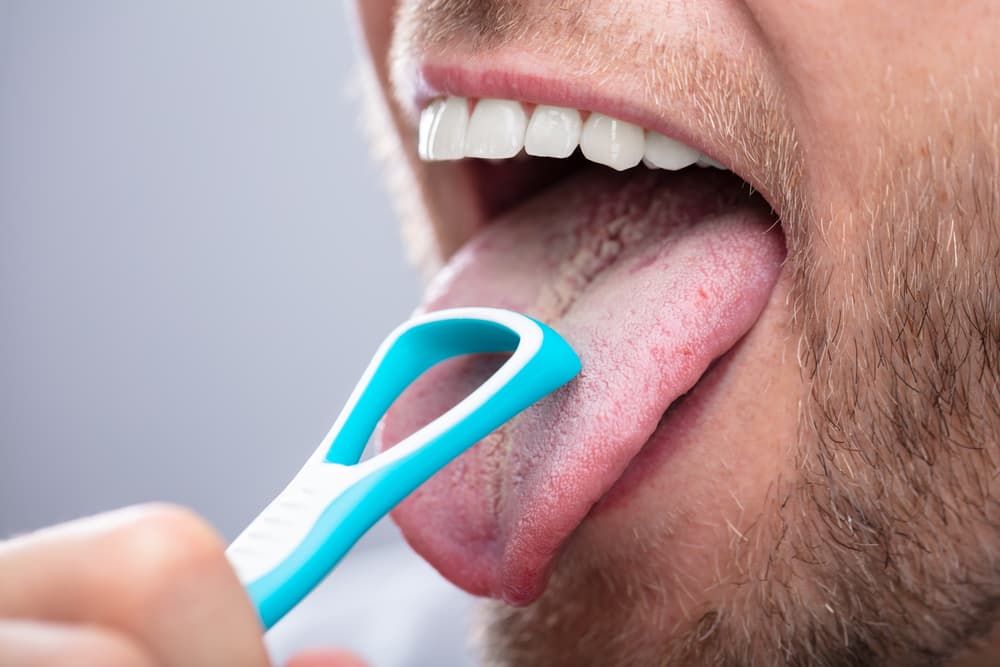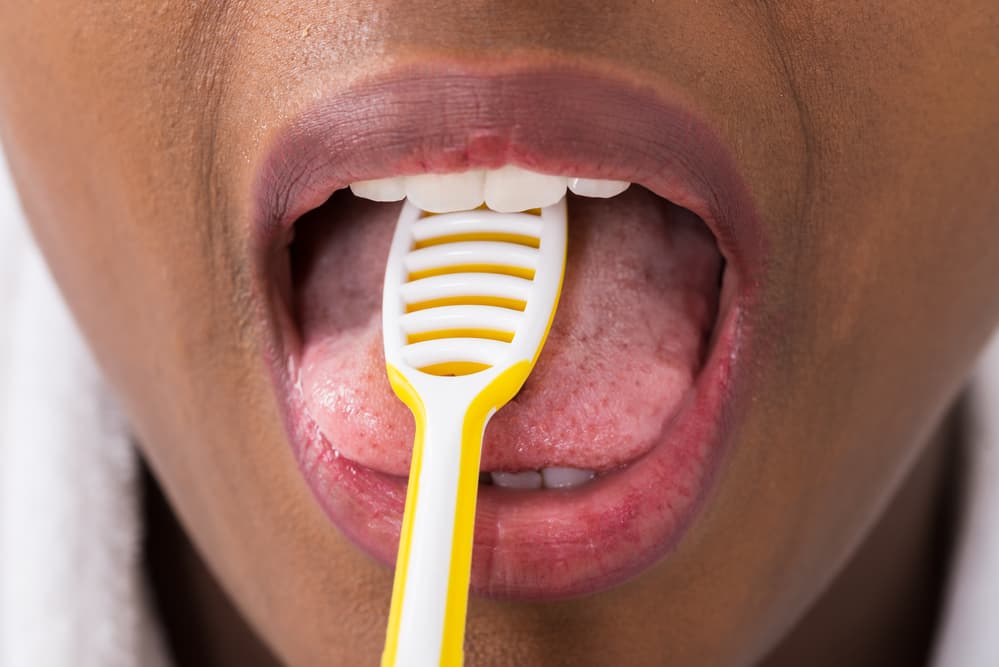Tongue scraping is a beauty routine supposed to form part of your good oral hygiene practice as it has so many benefits that could also protect you from diseases and conditions associated with oral health.
This article will give you an understanding of what tongue scraping is all about, the benefits and side effects therein.
Moreover, we will look at some other ways to be adopted which could improve your oral health and the other risks factors or symptoms to look for that should send you to the dentist.
What is tongue scraping?
When you are removing the extra particles from the surface of your tongue using a small, plastic or metal instrument which is usually round we say you are tongue scraping.
This is a common practice because people do it in order to scrape out bad breath causing particles so as to improve their oral health.
The benefits of tongue scraping
With every consumption of food comes debris that just stick on your tongue and sometimes these are difficult to remove without a specialized help of items like metal tongue scrapers, or enabled toothbrushes.
These debris tend to build up on the tongue if not removed to a point where they harbor bacteria over time. Sadly, these bacteria are a leading cause of bad breath and plaque which negatively impact your oral health.
As such scrapers are used to help remove this tongue buildup. These are the other benefits of using a tongue scraper;
How to use a tongue scraper
Here’s the right way to use your tongue scraper. It’s quick and easy, so you shouldn’t have any problems:
- Stick out your tongue and start scraping from the back.
- Run your tongue scraper from the back to the front twice or thrice.
- Be careful and only apply gentle pressure. If it hurts then you are doing it wrong.
- Gargle your mouth with water
- After you are done, rinse your scraper between scrapes with warm water.
Here is a video explaining how to use a tongue scraper
sense of taste improvement
When your taste buds are improved you are able to enjoy your food with the ability to distinguish between sensation such as;
- salty,
- sour,
- bitter,
- and sweet.
The tongue appears clean and good
When the debris has built up overtime, the tongue will have a white coated look and thus lose its natural color. Therefore, regular tongue scraping will ensure prevent the white tongue coating from forming and give you a good tongue cleaning.
Remove bacteria
This habit will sure kick bad breath and dental decay to the curb, totally. Several studies reported that using tongue scrapers two time a day is effective enough to reduce the growth of bacteria. (source)

Overall oral health improvement
There is a lot of problems caused by bacteria in the mouth;
- cavities,
- dental disease,
- bad breath
- among other conditions affecting the mouth.
Moreover, all of these impair your oral health. using a tongue scraper prevents these conditions as well as improving your overall oral health. (source)
Reduce bad breath
Scraping is said to be more effective at removing debris than brushing. However, this is NOT done as a replacement to brushing your teeth. More importantly, tongue scraping removes the bacteria that cause bad breath.
One point to remember is, as long as you consume food, you expose your tongue to debris and as such tongue scraping must be done consistently on a daily basis for you to see and experience its great benefits.
To prevent a long-term buildup of debris, you could even scrape your tongue after eating a meal. Moreover, tongue scraping is done when you brush your teeth as the two must go hand in hand.
Contrary to the popular belief that a toothbrush use is just as effective as using a tongue scraper, tongue scrapers are reportedly 30% more effective in removing bacteria than toothbrush. (source)
Tutorials for doing tongue scraping
It is imperative to use the right tool, one that is designed to perform tongue scraping, period. Moreover, there is a lot of option on the market to choose from;
- Plastic,
- copper,
- and stainless steel.
Moreover, tongue scrapers will have a rounded shape resembling an inverted spoon. In situations where you find yourself without the right tool, the better improvising tool could be a clean spoon or toothbrushes. You must use those with the knowledge that they are not as effective as using the right tool.
These are the steps to follow when performing tongue scraping:
- open your mouth, and stick out your tongue after standing in front of a mirror.
- Let the rounded end of the tongue scraper be gently set at the back of your tongue.
- Ensure that you start at the middle of your tongue while gradually starting from farther back as you get used to scraping. This will sure prevent gaggling.
- And then touch the scraper to your tongue, gently. Let the scraper be slowly pulled forward, toward the tip of your tongue. Make sure that you don’t push the scraper from the tip of your tongue backwards. The right technique is always going from the back of the tongue to the tip of the tongue.
- You must have a cloth or tissue so as to remove debris from the scraper after each scrape,
- one to two scrapes could be done on the same area. Moreover, repeat scraping once or twice in one area until the entire surface of your tongue is done.
- When you are done tongue scraping, the tongue scraper must be washed with warm water and soap, after drying it, make sure that you store your tongue scraper in a clean, and dry area.
Moreover, the whole experience can take up to 2 minutes or less. So, this is time that can be invested and fitted into your daily routine for your overall oral health.

Side effects or risks of performing a tongue scraper
It is important to look at these side effects as all of them can affect your oral health negatively. Using the tongue scraper should not lead to cutting, or bleeding as these open wounds that could easily harbor bacteria leading to infection.
Moreover, inducing vomit affect your digestive system while compromising your teeth as you regurgitate acids which could harm your teeth in a long run.
There are few side effects and risks attached to tongue scraping;
Gag reflex stimulation
This is a concern as it could lead to vomiting. Thus, this is prevented by always ensuring that the scraper is gradually taken back to your tongue while you start in the middle to the tip of the tongue.
Cutting the tongue surface
Using an uneven or the tongue scraper with rough edges could accidentally cut the surface of your tongue. To prevent accidental cuts, you need to inspect your tool every time before you use it to ensure it is still safe for use.
Application of gentle pressure during use
Failure to be gentle could harm your tongue badly by either; break the skin or alter and harm your taste buds. Thus, there must be a balance between being firm enough to remove debris and not being too harsh to injure yourself.
Moreover, it is safer to start softer and increase the intensity as you go, while ensuring you don’t get too carried away.
How to improve your overall oral health?
There are many process involved in achieving having a good oral hygiene and tongue scraping alone is not nearly enough.
Many ways to incorporate into your oral hygiene routine:
- Your toothpaste and mouthwash you used must be fluoride-based in order to help fight cavities.
- Your teeth and gums must be brushed twice a day.
- Every episode of brushing should last longer than two minutes. Find ways to ensure you can keep count of how long it took you to brush your teeth.
- The tough-to-reach debris between your teeth will need to be removed using a dental floss. These can be used at least once a day.
- To prevent dryness on your mouth, you must hydrate it by regularly drinking water. This will sure prevent bad-odor.
- tobacco products must be avoided completely as it contributes to debris buildup on the tongue.
More importantly, regular visits to the dentist should for part of your habit. Seeing the dentist for cleaning and checkups twice a year is sufficient unless you have some oral health problems or disorders.
Benefits of good oral hygiene
There is so many benefits for practicing good oral hygiene;
Gum Disease risk is Reduced
Irregular brushing of teeth coupled with lack of other good oral hygiene potentially lead to gingivitis and periodontitis leading to;
- swelling and bleeding of gums,
- bad breath,
- tooth loss.
Tooth decay risk reduction
This means cavities won’t develop with regular brushing, flossing, etc.
Heart disease risks reduced
There is some scientific data supporting that those with poor oral hygiene are more likely to develop heart attack and stroke. (source)
Diabetes risks reduced
Gum diseases are known to increase your sugar levels in your body thus predisposing you to diabetes.
Reducing your risk of developing lung disease
The bacterial infection on your gums and teeth cause inflammation which could cause these bacteria to move to your lungs to eventually cause lung infection if not treated.
Alzheimer’s risk reduction
The inflammation on the gums due to bacterial infection could release chemicals that travel to the brains resulting to memory loss over time.
Dentist consultation
There are some conditions that cannot be cured by just scraping your tongue. So, you need to consult your dentist as some of these conditions can be harmful or may be a symptom of serious diseases.
Symptoms presenting themselves by drying your mouth as a sign of underlying diseases and conditions such as;
- diabetes,
- stroke,
- thrush (yeast infection)
- Alzheimer’s disease
- Autoimmune disease (HIV/AIDS, or Sjogrens syndrome)
When you have hairy tongue, you will definitely need to consult your dentist. Hairy tongue is caused dead cells build-up on the tiny projections containing taste buds as such it gives its subjects a metallic taste in the mouth while also having these symptoms;
- Discoloration of the tongue
- Hairy and furry appearance
- And bad-breath.
This conditions are a result of poor oral hygiene yielding too much bacteria or yeast growth in the papillae of the mouth. These are also caused by;
- smoking tobacco,
- excessive alcohol consumption,
- excessive consumption of coffee or tea,
- dry mouth,
- side effects of certain medication.
Frequently Asked Questions (FAQs)
Do tongue scrapers damage taste buds?
A tongue scraper can damage your taste buds if you press it too hard. The trick is to use the tool correctly while inserting minimal pressure. Your scraper shouldn’t have any sharp ends that could cause injury.
Is tongue scraping better than brushing?
Scraping your tongue is 30% more effective than using a soft bristle toothbrush, research shows. Tooth scrapers are more aggressive and highly likely to remove more volatile sulfur compounds from your tongue than toothbrushes.
Can I use a spoon as a tongue scraper?
Spoons are excellent alternatives to tongue scrapers. Simply ensure that you moisten the spoon, turn it upside down and drive it forward inside your mouth. However, tongue scrapers are affordable and easily available in local drugstores.
Conclusion
Tongue scraping is definitely a good part of oral hygiene which protects us from many conditions. Moreover, this is not the only way to keep your teeth healthy. Although tongue scraping has many benefits, it has to be done well otherwise, you risk cutting or injuring you tongue or gums.
That’s why it is important to allow yourself to learn the right technique and to also make this practice part of your daily routine for a clean and healthy mouth.
